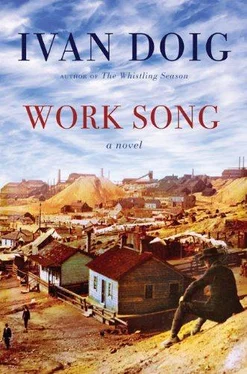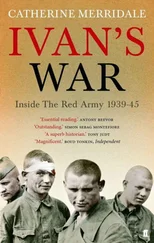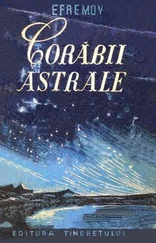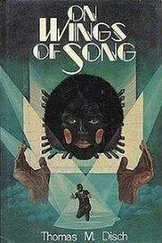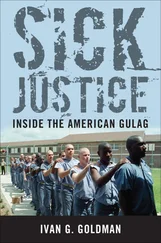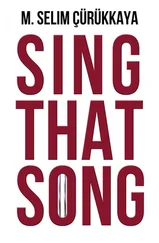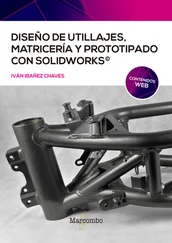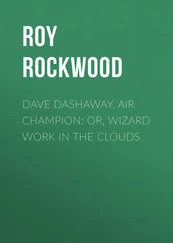“Righto. Here goes.”
There on the sidewalk, Griff squared himself up, took a stance amid the passersby like Caruso among the opera extras, and began to sing in a croaky baritone, to the tune of “The Old Oaken Bucket.”
My old copper collar,
It makes my heart so proud.
When I wear the copper collar,
I fit right with the crowd.
No wedding band
Was ever so grand,
So it is always there to see,
The old copper collar,
That Anaconda fastened on me.
Griff finished on a sardonically sweet note that was very nearly a warble. Up in the top floor of the Hennessy Building, someone in a celluloid collar frowned down and the window was shut with a bang.
“The Butte spiritual.” Hoop defined Griff’s performance for me, and onward we went.
IT WAS WHEN the two of them tramped me up the streets to the other butte, the rising ground where those long-legged headframes spraddled atop the dozens of mineshafts and piles of tailings spilled down the hillside like gopher diggings, that the two of them truly came into their element. To me, the Hill seemed otherworldly, half mammoth factory, half fathomless wasteland; to my companions, it was home. Their bent backs straightened, and their gait became more spry. The ear-stinging screech of pulleys as ore loads were hoisted from the depths of the earth and elevator cages were let down seemed to reach them as the most melodious of sounds. In accompaniment, Hoop turned suddenly voluble. “We drilled in every corner of this hill, didn’t we, Griff. In the Neversweat and the Glengarry and the Parrot and the Nipper and most of these other mines you see. One of us on the steel and the other on the hammer. We was a flash team, if I do say so myself. We’d make the hole in the rock in nothing flat, then set the dynamite, and blooey! Break loose a wall of ore that’d keep a mucking crew busy half a day.” In all likelihood it was the effect of Hoop’s words, but I thought I felt a tremor in the ground as he spoke. He paused, gazing around at the modern-day mining apparatus. “Now they drill with air.” I took that to mean high-powered compressed-air drills, the throb of giant compressors a steady beat within the industrial medley around the mineshafts.
There is hardly any story more deeply engraved in human experience than a search for the Promised Land, a New Jerusalem where life can flourish and dreams run free. What a saga it was, then, that the barren rise of earth the three of us were standing atop had become such a place, to those unafraid to go into its depths. From what Hoop and Griff had told me the night before, I knew that the Hill’s copper diggings, in the course of time and union persistence, had brought forth wages that workingmen anywhere else could only imagine. Four and a half dollars a day! my informants chorused with pride, at that time probably equaled only by Henry Ford’s assembly line in Detroit. And no man who called himself a miner wanted to bolt fenders onto flivvers for a living. So, dust devils and dump heaps and discolored soil and everything else, the startling land I was gazing at was worshipped by hard-rock miners for its holy wage; in the pits and shafts of the world, the saying was, “Don’t even stop in America, just go to Butte.”
Griff, silent until now, had been watching the loaded ore cars trundle into view one after another at the Neversweat, a colossus of a mine with seven smokestacks rising from its buildings like a row of stark totems. “Got to hand it to Anaconda,” he said grudgingly, “the buggers know how to get the ore out. Looky there, Hoop, they’ve busted up through the south shaft of the ’Sweat.” An obviously fresh fence, its posts unweathered, enclosed a crater so gaping that it looked as if a meteor had struck and blazed on through to the core of the earth. Or at least so deep that anyone who fell in would go to glory, so to speak.
Brows all of a sudden furrowed with thought, my companions exchanged glances. “Morrie,” said Hoop, “you maybe ought to know something-”
“-about the boardinghouse,” said Griff, and then and there, they chorused the likelihood that in time to come Anaconda would have its greedy eye on Grace’s property.
“Don’t blab that to Mrs. Faraday,” they anxiously cautioned me. “There’s no sense worrying her head off beforehand.”
“I won’t be the bringer of that news,” I pledged.
MY TOUR, to hear my guides tell it, now was about to really begin. For there, amid the gray polar wastes of that Richest Hill, were scattered the pockets of populace that I had glimpsed from the train station.
“Here’s where the work of the world comes from,” Griff pronounced, and Hoop bobbed agreement. Between them, they pointed out each neighborhood. Finntown, straggling below the colossal Neversweat. The Italians, it was stressed to me, occupied Meaderville, not be confused with Centerville, where the Cornish congregated. Griff proudly singled out the smallish Welsh area of St. David’s, christened for its church, near our boardinghouse; beyond that, the Serbians had their several blocks, elsewhere the Scandinavians had theirs, and below, at the edge of downtown, lay Chinatown, self-explanatory. My head was beginning to spin, and we had not even come to the sprawl of streets dead ahead, the Irish avalanche of small frame houses and overloaded clotheslines that constituted Dublin Gulch and beyond.
Wisely, Hoop hailed a mailman, and in a brogue that justified his assignment to the route, the postal carrier told me with great elaboration how to find the house of that night’s wake.
That job done, Griff proclaimed: “You’re all set, Morrie. The only thing to watch out for tonight is-”
Commotion blasted the last of his words away, so sudden and sharp my eardrums winced. The Hill had turned into a calliope, whistles shrieking at every mineshaft. “Change of shifts!” one or the other of my companions yipped as if school had let out.
Those next minutes will never leave me. Down from the mine mouths into the sloping streets cascaded hundreds of workworn men, turning into thousands as we stood watching. The Hill was black with this exodus. Here, on foot, the neighborhoods sluiced together as the miners trudged past, accented English of several kinds mingling with tongues my ear could not readily identify. It was as if Europe had been lifted by, say, the boot heel of Italy and shaken, every toiler from the hard-rock depths tumbling out here. Old habits had followed them across the ocean, husky Finns clustered with other Finns, the Cornishmen not mingling with the Italians, on across the map until each of the nations of Butte came to its own home street.
By now Griff and Hoop were wistfully calling out to fellow Welshmen going by. “Keep fighting for that lost dollar, boys! We’re with you all the way, Jared!” This last, I could tell, was addressed to a lean, dark-featured individual at the front of the group, not nearly as far along in years as most of the other miners but plainly a leader. Striding along with a measured tread I identified as military, the younger man grinned through his grime and sent my companions a half wave, half salute.
“What, is there a wage dispute?” I asked in surprise, having heard the hosannas about the riches of the World’s Richest Hill.
“There usually is,” Griff grumped, Hoop nodding, “but this one’s bad. The damn company just told the union it’s lopping a whole dollar off the daily wage, can you imagine?” The calculating part of my brain certainly could; a twenty-two percent cut, a severe reversal of the Hill’s holy standing. “That’s a poke in the eye if there ever was one,” Griff was fulminating further. “Jared there and his council are working on how to turn it around, you can bet.”
“A strike?” I knew from their earlier recital of labor’s struggles that the last time the union leadership called one, the strike had failed when Anaconda’s hired thugs broke the spirit of the mineworkers.
Читать дальше
